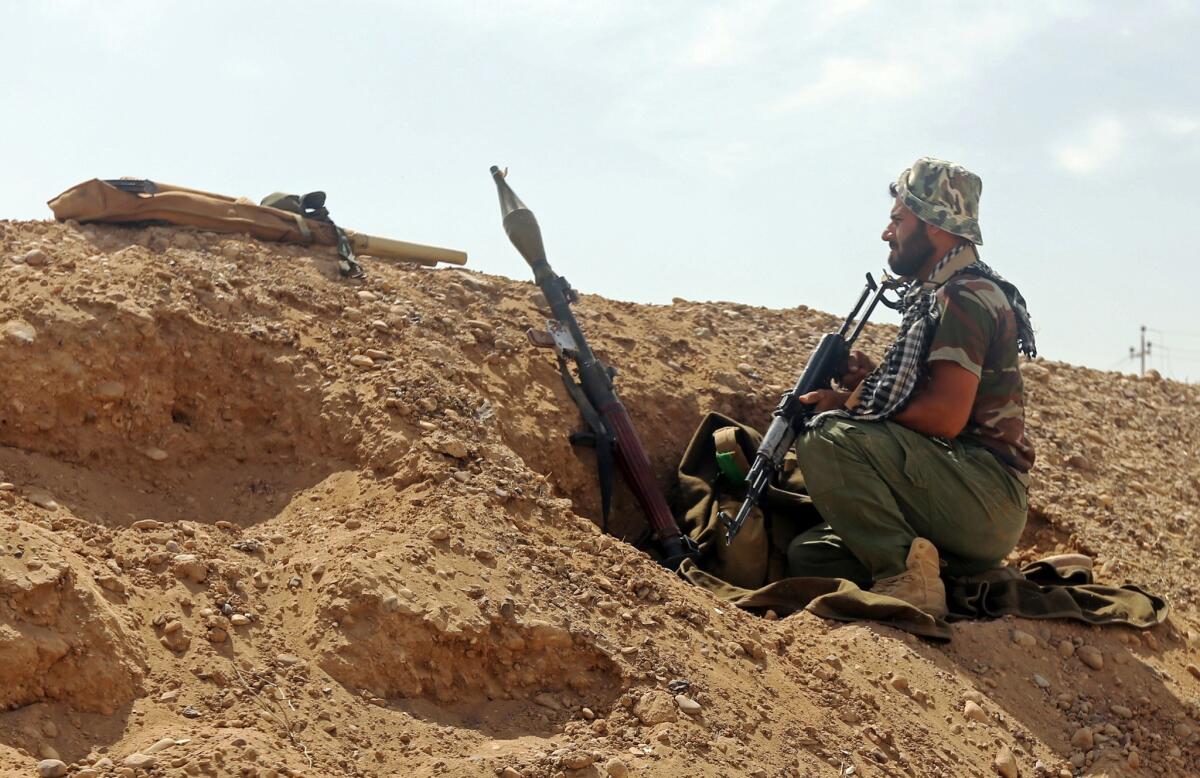Iraqis rename offensive in Sunni area; original title honored Shiite

An Iraqi militiaman holds a position in the Nibaie area northwest of Baghdad on May 27 during an operation aimed at cutting off
- Share via
Reporting from Beirut — Iraqi officials Wednesday hastily rebranded a just-launched government offensive to retake Anbar province, responding to fears that the operation’s original title might inflame sectarian tensions.
The abrupt name change came as the opening salvos were launched in the closely watched battle to recapture the city of Ramadi, capital of Anbar province, in Iraq’s Sunni Muslim heartland.
Islamic State militants seized Ramadi less than two weeks ago in a major blow to the central government.
Iraqi Prime Minister Haidar Abadi officially renamed the offensive after considerable criticism within Iraq and from abroad greeted the originally proposed title, “Lubbayk ya Hussein,” in honor of Hussein, a revered historical figure in Shiite Muslim belief.
The Hussein title had been bestowed upon the mission by a spokesman for an umbrella group of mostly Shiite militias that are key participants in the effort to retake Ramadi, a largely Sunni city. The central government never formally endorsed the Hussein label and was quick to seek out a more inclusive alternative in a nation often riven by tensions between Shiites and Sunnis.
The Anbar battle, the prime minister’s spokesman told local media on Wednesday, will henceforth be called “Lubbayk ya Iraq,” or roughly, “At your service, Iraq.” It is a slight but significant variation of the previous “At your service, Hussein.”
On Tuesday, a Pentagon spokesman, Col. Steve Warren, had described the choice of name dedicating the battle to Hussein as “unhelpful.”
Sunni Arab commentators in Iraq and elsewhere in the Arab world also criticized the invocation of Hussein as casting a sectarian shadow over the operation.
Even some Shiite leaders viewed the use of Hussein’s name as ill-considered.
Shiite cleric Muqtada Sadr, in a statement Wednesday responding to questions from theology students in Najaf, expressed his own reservations.
“Such a name will inevitably be misconstrued and all who love the homeland and shun sectarianism should not acknowledge such names,” declared Sadr, according to local news outlet Sama Baghdad
The firebrand cleric, whose paramilitary forces once battled U.S. troops, offered his own suggestion: “Lubbayk ya Anbar,” or roughly, “In your service, Anbar.”
The fallout from the naming of the Anbar operation was one more illustration of the sectarian calculus that continues to divide Iraq, where many in the Sunni minority are highly mistrustful of the Shiite-led government in Baghdad.
The U.S.-led invasion that ousted Saddam Hussein in 2003 set the stage for a punishing sectarian civil war between Shiites and Sunnis, leaving thousands dead and building a legacy of deep distrust.
Nonetheless, Shiite irregular units, some trained and equipped by Shiite Iran, are among Iraq’s most effective fighting forces.
The mostly Shiite militias will form the vanguard of pro-government forces converging to retake Ramadi, a key strategic goal for Abadi’s government. They will fight alongside the military and police units. A contingent of some 4,000 Sunni tribal militiamen also will be part of the attacking force, the government says.
The loss of Ramadi was a humiliating defeat for Baghdad. On Sunday, U.S. Secretary of Defense Ashton Carter charged that the numerically superior Iraqi forces had lost the will to fight, a sentiment rejected by Abadi and the Iraqi military command.
The highly motivated militiamen have been at the forefront of several assaults against Islamic State, an ultra-fundamentalist Sunni movement that views Shiites as heretics. In Iraq’s Diyala and Salahuddin provinces, the Shiite paramilitary fighters have been accused of exacting sectarian payback against local Sunni populations.
Many fear that deploying the largely Shiite units en masse in heavily Sunni Anbar may worsen sectarian strife.
Although held in high regard by both Sunnis and Shiites, Hussein is especially esteemed by Shiites as a martyr who was defeated and beheaded in the battle for Karbala in AD 680, a key event in Shiite Islam. Each year, his death is commemorated by Shiites worldwide in a 10-day outpouring of grief that culminates in funeral processions, reenactment of the events in Karbala and even self-flagellation.
The change in the name of the Iraqi offensive comes as the government proclaimed its forces had begun to “liberate” some stretches of militant-held territory in the vicinity of Ramadi.
The Interior Ministry quoted Anbar operations commander Brig. Gen. Qassem Mahmadias as saying that security forces, along with militia and tribal fighters, “secured control of the important outlets used by the Daesh gangs,” according to semi-official state news outlet Al Iraqiya. Daesh is a common Arabic acronym for Islamic State.
But reports from Iraq indicated that militants, perhaps using the cover of a sandstorm, had launched a wave of suicide attacks against Iraqi forces near the city of Fallouja, about 25 miles east of Ramadi, killing many pro-government fighters.
Deploying armored trucks filled with explosives and driven by suicide bombers is a favorite tactic of Islamic State, which boasts of having multitudes of such fighters in its ranks. Military analysts call the suicide attacks devastating and extremely effective and say the Iraqis must find a way to counter the tactic.
Bulos is a special correspondent.
Follow McDonnell at @mcdneville on Twitter for news out of Iraq
More to Read
Sign up for Essential California
The most important California stories and recommendations in your inbox every morning.
You may occasionally receive promotional content from the Los Angeles Times.











